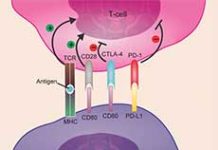On 13 November 2020, the US Food and Drug Administration granted accelerated approval to pembrolizumab (KEYTRUDA, Merck & Co.) in combination with chemotherapy for the treatment of patients with locally recurrent unresectable or metastatic triple-negative breast cancer (TNBC) whose tumours express PD-L1 (CPS ≥10) as determined by an FDA approved test.
FDA also approved the PD-L1 IHC 22C3 pharmDx (Dako North America, Inc.) as a companion diagnostic for selecting patients with TNBC for pembrolizumab.
Approval was based on KEYNOTE-355 (NCT02819518), a multicentre, double-blind, randomised, placebo-controlled study in patients with locally recurrent unresectable or metastatic TNBC, who had not been previously treated with chemotherapy in the metastatic setting. Patients were randomised (2:1) to receive pembrolizumab 200 mg on day 1 every 3 weeks or placebo in combination with different chemotherapy treatments (paclitaxel protein-bound, or paclitaxel, or gemcitabine plus carboplatin) via intravenous infusion.
The main efficacy outcome measure was progression-free survival (PFS) as assessed by blinded independent review according to RECIST v1.1, tested in the subgroup of patients with CPS ≥10. Median PFS was 9.7 months (95% confidence interval [CI] 7.6, 11.3) in the pembrolizumab plus chemotherapy arm and 5.6 months (95% CI 5.3, 7.5) in the placebo arm (hazard ratio 0.65; 95% CI 0.49, 0.86; one-sided p-value = 0.0012).
The most common adverse reactions (incidence ≥20%) in patients receiving pembrolizumab plus chemotherapy in KEYNOTE-355 were fatigue, nausea, diarrhoea, constipation, vomiting, alopecia, rash, cough, decreased appetite, headache. The most common laboratory abnormalities (incidence ≥20%) in patients receiving pembrolizumab plus chemotherapy were anaemia, leukopaenia, neutropaenia, lymphopaenia, thrombocytopenia, elevated ALT and AST, hyperglycaemia, hypoalbuminaemia, increased alkaline phosphatase, hypocalcaemia, hyponatraemia, hypophosphataemia, and hypokalaemia.
The recommended pembrolizumab dose for adult patients with locally recurrent unresectable or metastatic TNBC is 200 mg every 3 weeks or 400 mg every 6 weeks administered prior to chemotherapy until disease progression, unacceptable toxicity, or up to 24 months. When given with pembrolizumab, either paclitaxel protein bound 100 mg/m2 on days 1, 8 and 15 every 28 days, or paclitaxel 90 mg/m2 on days 1, 8 and 15 every 28 days, or gemcitabine 1000 mg/m2 plus carboplatin AUC 2 mg/mL/min on Days 1 and 8 every 21 days is administered via intravenous infusion.
Full prescribing information for KEYTRUDA is available here.
This review used the Assessment Aid, a voluntary submission from the applicant to facilitate the FDA’s assessment.
This application was granted accelerated approval based on PFS. Continued approval for this indication may be contingent upon verification and description of clinical benefit in the confirmatory trials.
Healthcare professionals should report all serious adverse events suspected to be associated with the use of any medicine and device to FDA’s MedWatch Reporting System.
For assistance with single-patient INDs for investigational oncology products, healthcare professionals may contact FDA’s Oncology Center of Excellence Project Facilitate.






